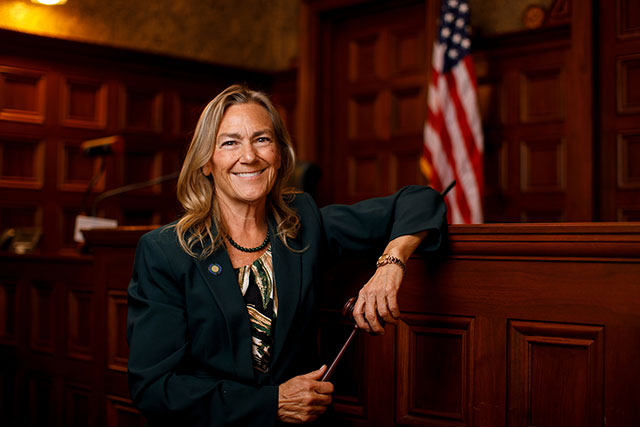“My mom could find a camera and be in front of it without batting an eye,” Seay recalls, as she pauses from fixing her hair in her Merwin Hall office for yet another TV appearance. “She had her picture taken with presidents and ambassadors, governors and scions of industry. It was very natural for her. She would like this.”
“This” means live and taped appearances on local news and national Court TV this fall for her take on daily courtroom proceedings in a sensational murder trial unfolding in Southwest Florida; weekly local TV spots and newspaper interviews on wildly ranging legal and political topics; and channeling her scholastic credentials and media savvy to educate the public as well as the next generation of law and justice professionals graduating from FGCU.
“A university should be of benefit to the community in more ways than just teaching children,” Seay explains. “My goal is to help educate people in words we all understand, to take difficult legal concepts and break them down into small chunks that make sense to everyone.”

Frankly, Seay could be raking in bigger bucks practicing law full time — a fact her 95-year-old father and Wharton School grad reminds her of frequently. Of the more than 100,000 Florida Bar members, she is one of fewer than 60 practicing attorneys certified in international law. She has represented a dizzying diversity of clients in the U.S. and abroad, from The Citadel to Anheuser-Busch, the American Dental Association to individuals fighting to save stray cats or endangered species of dolphin.
“I feel like I make a difference as a professor — more than I ever could as a lawyer,” Seay says. “As a lawyer, you might have one client who maybe doesn’t go to jail or goes to jail for less time. When you’re teaching there are 50 kids in there. I’m going to make a difference somehow with each and every one of them. They are the future of the world. I want to be part of making them the best they can be.”
Being available — and in demand — to provide perspective on current events obviously helps raise the profile of FGCU locally and nationally. Court TV, for example, called on Seay recently to address how Florida’s death penalty laws differ from other states, how and why attorneys try to discredit witness testimony, and the impact of a murder trial on jurors before, during and after the experience.
Maintaining a media presence encourages the part-time attorney to stay up to date on legal issues, Seay says, and gives her an additional teaching tool that students can relate to. A case making headlines and stirring social media buzz can help them understand complicated concepts they’re encountering in the classroom.
“It adds a new dimension to their education,” she says. “If you can link something you say in a news clip to what you’re talking about in class, the next thing you know they’re talking about it. From that moment, they realize the things they’re learning are absolutely related to things going on in the real world.”
Seay, who’s serving her sixth term as an elected commissioner of the Charlotte County Airport Authority, wields an ever-growing portfolio of sound bites. And not just on constitutional law issues, such as gun ownership or freedom of speech. Money laundering, counterfeiting, consumer fraud, cannabis law, aviation and water rights — name a legal issue and she’s probably commented on it for a media outlet. She’s been quoted in Thomson Reuters Westlaw — big-time cred for a lawyer. Speaking engagements and media interviews have pushed her CV to 32 pages and counting.
“They want to talk about all these off-the-wall things, but if it’s law-related I’m going to give it a shot,” she says.
In some ways, that game-for-anything mentality reflects the Fulbright Scholar’s path in life: from unenthusiastic undergraduate to an eventual BFA in graphic design; from dabbling in radio to running unsuccessfully for Congress in 1980 at age 24 and rubbing elbows with Ronald Reagan; from being told she “wasn’t smart enough to be a lawyer” to graduating with a JD near the top of her University of South Carolina class.
In addition to her publishing credits and community engagements, Seay’s professional website showcases sketches from her travels — The Parthenon in Athens, The Colosseum of Rome, a “Welcome to Fabulous Las Vegas” sign.
She sees parallels between her avocation and her vocation.
“Art and law both require a lot of creativity — a different kind, but you have to be thinking creatively all the time,” she explains. “My art background really helped me become a better lawyer.”
And becoming a better, more informed lawyer, as she says, has made her a better role model for tomorrow’s legal Eagles.
- WATCH VIDEO: Pamella Seay talks about regulating the state’s hemp industry
- WATCH VIDEO: Pamella Seay talks about ads for fake prescription drugs
MEDIA MASTERS
As part of this series of stories about FGCU’s most publicly known pundits, media maven Pamella Seay offered a few tips for other faculty who want to work with reporters:
- Figure out what they want and give it to them. Ask the direction they’re taking with the story.
- Understand their timeframe and visual needs. Deadlines are critical to media.
- Make context clear, even if you have to repeat yourself. If you educate reporters, they’ll ask better questions.